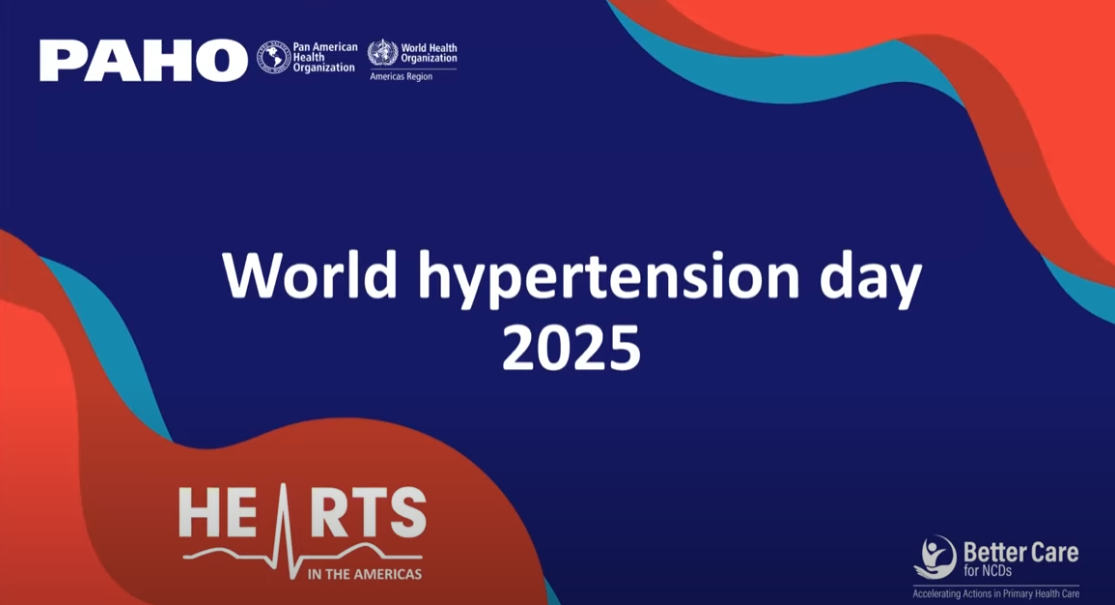
Hypertension is the leading cause of death worldwide. It causes heart attacks, strokes, kidney failure, worsens diabetes, and significantly contributes to the development of dementia. In the Americas, cardiovascular disease causes more than 2.2 million deaths each year—more than 6,000 people per day—and it is estimated that 1 in 3 of these deaths could have been avoided.
Although healthy lifestyle choices—such as staying active, eating fresh foods, and reducing salt intake—are essential for prevention, 4 in 10 adults in the region already live with hypertension, and a third of them don't know it. Among those diagnosed, 4 in 10 are unable to control their blood pressure, thus increasing their risk of cardiovascular disease.
- Promote the strengthening of primary health care as a central pillar for the effective control of Hypertension in the Americas by disseminating successful experiences, technical advances, and innovative strategies implemented in the region through the HEARTS program.
- Promote collaborative and multidisciplinary work within health systems, highlighting the role of care teams, including physicians, nurses, and pharmacists, in the early detection, treatment, and comprehensive follow-up of people with hypertension.
- Promote the development of public policies and regulatory frameworks that foster continuous quality improvement in cardiovascular disease control through evidence sharing, tools such as the HEARTS cardiovascular risk calculator, and national recognition of best practices.
On May 15, 2025, the webinar “Primary Health Care at the Heart of Hypertension Control in the Americas” was held, organized by the Pan American Health Organization (PAHO) as part of World Hypertension Day.
The event was opened by Pedro Ordúñez with welcoming remarks, followed by a presentation on the meeting's technical regulations. An institutional video was then shown summarizing the progress of the HEARTS program between 2022 and 2025, outlining the progress made toward hypertension control in the region.
One of the highlights was the presentation of the 2025 World Hypertension League Organizational Excellence Award to the Ministry of Health of the Dominican Republic, with speeches by Professor Gianfranco Parati and Minister Víctor Atallah, who expressed his gratitude for the recognition. This was followed by an introduction to World Hypertension Day and the HEARTS program, highlighting its importance in primary care. Pedro Ordúñez and Kenneth Connell presented key data on the progress of the HEARTS program in the Americas.
The first panel focused on expanding teamwork in hypertension care. Specialists from Argentina, Guatemala, and El Salvador participated, sharing experiences, strategies, benefits, and challenges in implementing the team-based care model in their respective countries. This was followed by a short video presentation on the HEARTS experience in Saint Lucia.
Subsequently, the integration of pharmacists into primary care was addressed through a panel with professionals from the United States, Canada, and Chile. Changes in pharmacist training, their participation in treatment intensification, and lessons learned from regulatory change processes to enable their effective integration were discussed.
Following a second video on the HEARTS cardiovascular risk calculator, a session on program quality, policy, and evaluation was presented by Esteban Londoño, who highlighted the importance of continuous improvement in the implementation of chronic disease management strategies. The meeting concluded with a video message from PAHO Director Dr. Jarbas Barbosa, reaffirming the institution's commitment to hypertension control through primary care.
- Pedro Ordunez, MD, PhD – PAHO, HEARTS in the Americas.
- Gianfranco Parati – Professor of Cardiovascular Medicine at the University of Milan-Bicocca, Italy; Scientific Chair and current President of the World Hypertension League.
- Víctor Atallah – Minister of Public Health and Social Assistance of the Dominican Republic. Cardiologist.
- Dr. Kenneth Connell – Associate Professor of Clinical Pharmacology at the University of the West Indies, Barbados, and regional expert in hypertension and cardiovascular risk management.
- Vilma Irazola – Director of the Chronic Disease Research Department at the Institute for Clinical and Healthcare Effectiveness (IECS), Argentina.
- Alicia Wellmann – Guatemalan physician and researcher, leader in the implementation of the HEARTS program and in primary care for chronic diseases.
- Matías Villatoro – Coordinator of Non-Communicable Diseases at the Ministry of Health of El Salvador, with extensive international experience.
- Emily Ridley – Clinical Pharmacist at Prisma Health in Columbia, South Carolina, USA.
- Stephanie Gysel – Clinical pharmacist and postdoctoral researcher at the University of Alberta, specializing in cardiovascular health and hypertension management.
- Carolina Neira Ojeda – Nurse, head of the Department of Noncommunicable Diseases at the Chilean Ministry of Health, leading national strategies for the prevention and control of chronic diseases, including HEARTS.
- Esteban Londoño – PAHO International Consultant, Quality Improvement Leader for the HEARTS Program's Regional Team in the Americas.
